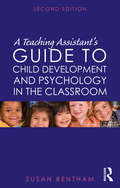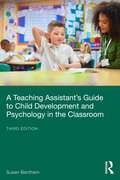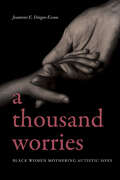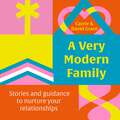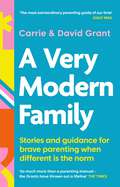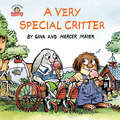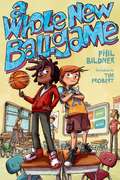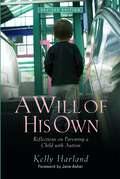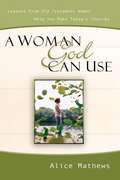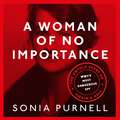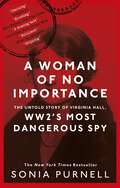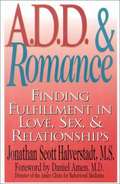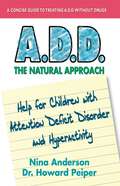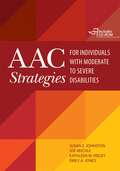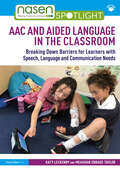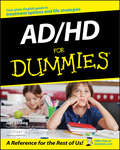- Table View
- List View
A Teachers' Guide to the Special Educational Needs of Blind and Visually Handicapped Children
by Sally S. MangoldSuggestions and ideas from educational officials on how to provide additional support to blind students in the classroom setting.
A Teaching Assistant's Guide to Child Development and Psychology in the Classroom: Second edition
by Susan BenthamHow can you help students most effectively in the classroom? As a Teaching Assistant, you play a vital role in today’s schools. This fully updated new edition will help you get to grips with the main issues to do with psychology and its role in the processes of teaching and learning. This accessible text, building on the success of a best-selling previous edition, provides informative, yet down-to-earth commentary with clear examples of how you can apply this knowledge in everyday practice. The book addresses issues including: how to support learning how to identify and cater for different learning styles teaching children with additional needs how to manage behaviour to support learning how to help children with their self-esteem and independence. This new edition includes references to up-to-date research in child development and psychology to include information regarding personalised learning, creativity, motivation, friendships skills, moral development and neuroscience. Chapters are complemented with lively case studies, self-assessment questions and examples of how to apply theory to everyday classroom practice. The reader is encouraged to develop reflective practice to best support childrens’ behaviour and learning. This reader-friendly book is an invaluable companion for every Teaching assistant, HLTA, Cover Supervisor, and anyone working in a supporting role in an educational setting.
A Teaching Assistant’s Guide to Child Development and Psychology in the Classroom
by Susan BenthamHow can you help students most effectively in the classroom? As a teaching assistant, you play a vital role in today’s schools. This fully updated third edition will help you get to grips with the main issues to do with psychology and its role in the processes of teaching and learning.This accessible text provides informative, yet down-to-earth commentary with clear examples of how you can apply this knowledge in everyday practice. This book addresses issues such as how to support learning and behaviour, how to create an optimal learning environment for all students, ways to encourage pupil voice, supportive strategies for children with additional needs, and how to help children with their self-esteem and independence. This new edition includes references to up-to-date research in child development and psychology to include information regarding wellbeing, mental health, and learning strategies related to insights from cognitive science. Chapters are complemented with lively case studies, self-assessment questions, and examples of how to apply theory to everyday classroom practice. The reader is encouraged to develop reflective practice to best support children’s behaviour and learning.This reader-friendly book is an invaluable companion for every teaching assistant, HLTA, pastoral support assistant, learning mentor, classroom cover supervisor and anyone working in a supporting role in an educational setting.
A Team of Two (Houghton Mifflin Harcourt Vocabulary Readers #Leveled Reader: Level: 5, Theme: 4.2)
by Minnie TimentiIntroduction to assistance dogs.
A Thousand Worries: Black Women Mothering Autistic Sons (SUNY series in Black Women's Wellness)
by Jeannine E. Dingus-EasonAutism is rising across the United States but disproportionately affects Black children and their families. While White middle-class families tend to be the focus of autism research and services, A Thousand Worries tells the stories of fifteen Black mothers of autistic sons, including the author’s own story. Interweaving her personal experience and research findings, Jeannine E. Dingus-Eason examines the intersections of race, class, and gender and the complexities of parenting, care, and services for Black autism mothers, or BAMs. Dingus-Eason shows how BAMs leverage their faith, support networks, and knowledge of autism to advocate for their sons in cultural and sociopolitical contexts that consistently dehumanize, criminalize, and adultify Black boys. A Thousand Worries will give families, scholars, and practitioners in education, social work, human services, and health insight into not only BAMs' many concerns and challenges but also their strengths, strategies, and abiding love. At times moving, uplifting, funny, and raw, their testimonies illuminate the power dynamics between parents and providers, the value of supportive partnerships and mutual trust, and the need for culturally responsive services.
A Trip to the Zoo: A Grammar Tales Book to Support Grammar and Language Development in Children (Grammar Tales)
by Jessica HabibPete and Jem are having lots of fun at the zoo, but they both want to see different animals, and are pulling their mother in different directions! Targeting Subject-Verb-Object sentences and regular plurals, this book provides repeated examples of early developing syntax and morphology which will engage and excite the reader while building pre-literacy skills and make learning fun, as well as exposing children to multiple models of the target grammar form. Perfect for a speech and language therapy session, this book is an ideal starting point for targeting client goals and can also be enjoyed at school or home to reinforce what has been taught in the therapy session.
A Very Long Engagement
by Sebastien JaprisotSet during and after the First World War, A VERY LONG ENGAGEMENT is the tale of a young woman's search for her fiance who she believes might still be alive despite having officially been reported as "killed in the line of duty." Unable to walk since childhood, fearless Mathilde Donnay is undeterred in her quest as she scours the country for information about five wounded French soldiers who were brutally abandoned by their own troops. A VERY LONG ENGAGEMENT is a mystery, a love story, and an extraordinary portrait of life in France before and after the War.
A Very Modern Family: Stories and guidance to nurture your relationships
by David Grant Carrie Grant'So much more than a parenting manual; the Grants have thrown out a lifeline' THE TIMESA breakout book on the ever-expanding concept of familyCarrie and David Grant have an extraordinary family story to tell. They have four children, one of whom is adopted, and all have come with a curveball: mental health challenges, neurodivergence, trans non-binary identities, various sexualities, and they are a mixed-race family, too.It is a reflection of the fact that society is changing faster than most of us can keep up with. The wider concepts of family and community are being deconstructed. There are those who are desperately clinging to the old and those who are desperate for the new to be accepted. How do we hold our families and communities together in unity? How do we create a society where all are included and none are oppressed?In A Very Modern Family, Carrie and David share their challenges and discoveries of growing and shapeshifting to create an incredible, diverse family and community. With their multi-intersectional family, they share their own mindset changes and insights into how to construct a new, accepting and unified space, while providing a deep dive into real life, frequently encountered situations and pertinent, applicable advice.A Very Modern Family is an important guide for our times - full of pain, change and hope.
A Very Modern Family: Stories and guidance to nurture your relationships
by David Grant Carrie Grant'So much more than a parenting manual; the Grants have thrown out a lifeline' THE TIMESA breakout book on the ever-expanding concept of familyCarrie and David Grant have an extraordinary family story to tell. They have four children, one of whom is adopted, and all have come with a curveball: mental health challenges, neurodivergence, trans non-binary identities, various sexualities, and they are a mixed-race family, too.It is a reflection of the fact that society is changing faster than most of us can keep up with. The wider concepts of family and community are being deconstructed. There are those who are desperately clinging to the old and those who are desperate for the new to be accepted. How do we hold our families and communities together in unity? How do we create a society where all are included and none are oppressed?In A Very Modern Family, Carrie and David share their challenges and discoveries of growing and shapeshifting to create an incredible, diverse family and community. With their multi-intersectional family, they share their own mindset changes and insights into how to construct a new, accepting and unified space, while providing a deep dive into real life, frequently encountered situations and pertinent, applicable advice.A Very Modern Family is an important guide for our times - full of pain, change and hope.
A Very Modern Family: Stories and guidance to nurture your relationships
by David Grant Carrie Grant'So much more than a parenting manual - the Grants have thrown out a lifeline' THE TIMES'The most extraordinary parenting guide of our time' DAILY MAILA breakout book on the ever-expanding concept of familyCarrie and David Grant have an extraordinary family story to tell. They have four children, one of whom is adopted, and all have come with a curveball: mental health challenges, neurodivergence, trans non-binary identities, various sexualities, and they are a mixed-race family, too.It is a reflection of the fact that society is changing faster than most of us can keep up with. The wider concepts of family and community are being deconstructed. There are those who are desperately clinging to the old and those who are desperate for the new to be accepted. How do we hold our families and communities together in unity? How do we create a society where all are included and none are oppressed?In A Very Modern Family, Carrie and David share their challenges and discoveries of growing and shapeshifting to create an incredible, diverse family and community. With their multi-intersectional family, they share their own mindset changes and insights into how to construct a new, accepting and unified space, while providing a deep dive into real life, frequently encountered situations and pertinent, applicable advice.A Very Modern Family is an important guide for our times - full of pain, change and hope.
A Very Special Critter (Pictureback(R))
by Mercer MayerLittle Critter befriends a new student who uses a wheelchair in this classic full-color storybook! Children ages three to seven will enjoy this sweet story about friendship and acceptance, first published in 1992, with game cards, stickers, and a poster!Little Critter meets a student named Alex who uses a wheelchair. Before long, Little Critter learns Alex is just like everyone else, and they become the best of friends!
A Volcano in My Tummy: Helping Children to Handle Anger--A Resource Book for Parents, Caregivers and Teachers
by Eliane Whitehouse Warwick PutneyFrom the book jacket: Children often have problems with anger. Teachers often have problems with anger. Parents often have problems with anger. Why? Because we're afraid of anger. It may mean that someone is out of our control. It may mean that someone won't like us. It may mean that someone acts violently. This book is about living successfully, healthily, happily, nonviolently, with motivation, without fear and with good relationships. An accessible resource book for teachers, parents and all who care for children, it is full of stories, and easy-to-use games and exercises designed to encourage children to see their anger and to deal constructively with it. A Volcano in My Tummy includes sections on key concepts, building a child's self esteem, what adults can do when a child is angry, developing an anger management program, troubleshooting, and a special section for teachers that integrates the resource with other curriculum areas. Exercises are clearly described, indicating appropriate age levels, teaching strategies, materials and procedures to follow, with worksheets for the childrens' use. All are easily adaptable for use by teachers, parents or other caregivers.
A Way Of His Own
by T. A. DyerA lame boy from a very primitive nomadic tribe is abandoned by his family and, together with a girl stolen from another tribe, tries to survive a cruel winter.
A Wheelchair Rider's Guide: San Francisco Bay and the Nearby Coast
by Bonnie LewkowiczMany natural areas, parks, urban waterfronts, and hundreds of miles of trails along the California coast and on San Francisco Bay are now accessible to wheelchair riders and others with limited mobility. This book describes more than a hundred beautiful and interesting sites around the entire bay and on the ocean between Point Reyes and Santa Cruz. You will find opportunities to watch birds and other wildlife, picnic on blufftops and on shaded lawns by the water, camp on an island, fish off piers, watch sunsets over the surf, learn about the region's natural and human history, and enjoy yourself in many other ways. Too often, wheelchair riders hesitate to explore far from home because they don't know about barrier-free routes and the availability of restrooms and other facilities. The Coastal Conservancy funded this guide as part of its public access program, to encourage greater enjoyment of the natural riches we all hold in common.
A Will of His Own: Reflections on Parenting a Child with Autism - Revised Edition
by Jane Asher Kelly HarlandKelly Harland's stories explore her son's life to the age of 14, and the new and unexpected universe she and her husband - both professional musicians - must learn to navigate with him. Will's fears, anxieties, and obsessions can dominate daily life, making a trip to the grocery store seem like a walk across a minefield. But amidst these unpredictable 'flip-outs' and 'freak-outs,' there are moments of wonder. When Will finally learns the give and take of conversation, or dreams about his future, it rekindles his mother's belief that anything is possible.
A Woman God Can Use: Lessons from Old Testament Women Help You Make Today's Choices
by Alice MathewsOld Testament women show us how to live with difficult men, fight depression, accept leadership responsibilities, survive tough times, and more. This book is designed to be used as a Bible study for personal devotions or group discussions. Other books by this author are available from Bookshare.
A Woman of No Importance: The Untold Story of Virginia Hall, WWII's Most Dangerous Spy
by Sonia Purnell'A METICULOUS HISTORY THAT READS LIKE A THRILLER' BEN MACINTYRE, TEN BEST BOOKS TO READ ABOUT WORLD WAR II An astounding story of heroism, spycraft, resistance and personal triumph over shocking adversity. 'A rousing tale of derring-do' THE TIMES * 'Riveting' MICK HERRON * 'Superb' IRISH TIMES THE NEW YORK TIMES BESTSELLERIn September 1941, a young American woman strides up the steps of a hotel in Lyon, Vichy France. Her papers say she is a journalist. Her wooden leg is disguised by a determined gait and a distracting beauty. She is there to spark the resistance.By 1942 Virginia Hall was the Gestapo's most urgent target, having infiltrated Vichy command, trained civilians in guerrilla warfare and sprung soldiers from Nazi prison camps. The first woman to go undercover for British SOE, her intelligence changed the course of the war - but her fight was still not over. This is a spy history like no other, telling the story of the hunting accident that disabled her, the discrimination she fought and the secret life that helped her triumph over shocking adversity.'A cracking story about an extraordinarily brave woman' TELEGRAPH'Gripping ... superb ... a rounded portrait of a complicated, resourceful, determined and above all brave woman' IRISH TIMESWINNER of the PLUTARCH AWARD FOR BEST BIOGRAPHY
A Woman of No Importance: The Untold Story of Virginia Hall, WWII's Most Dangerous Spy
by Sonia Purnell'A METICULOUS HISTORY THAT READS LIKE A THRILLER' BEN MACINTYRE, TEN BEST BOOKS TO READ ABOUT WORLD WAR II An astounding story of heroism, spycraft, resistance and personal triumph over shocking adversity. 'A rousing tale of derring-do' THE TIMES * 'Riveting' MICK HERRON * 'Superb' IRISH TIMES THE NEW YORK TIMES BESTSELLERIn September 1941, a young American woman strides up the steps of a hotel in Lyon, Vichy France. Her papers say she is a journalist. Her wooden leg is disguised by a determined gait and a distracting beauty. She is there to spark the resistance.By 1942 Virginia Hall was the Gestapo's most urgent target, having infiltrated Vichy command, trained civilians in guerrilla warfare and sprung soldiers from Nazi prison camps. The first woman to go undercover for British SOE, her intelligence changed the course of the war - but her fight was still not over. This is a spy history like no other, telling the story of the hunting accident that disabled her, the discrimination she fought and the secret life that helped her triumph over shocking adversity.'A cracking story about an extraordinarily brave woman' TELEGRAPH'Gripping ... superb ... a rounded portrait of a complicated, resourceful, determined and above all brave woman' IRISH TIMESWINNER of the PLUTARCH AWARD FOR BEST BIOGRAPHY
A.D.D. & Romance
by Jonathan Scott HalverstadtThis book examines what it is like to have ADD and be in a relationship.
A.D.D. The Natural Approach
by Nina Anderson Howard PeiperChildren with ADD are given powerful drugs to cope with their condition, but the drugs often have dangerous side effects. Without medication, though, how can these children be helped? In their new book, Nina Anderson and Dr. Howard Peiper provide a creative solution for ADD. The authors first explain how ADD is triggered by a central nervous system imbalance, and then offer a variety of natural therapies, including proper nutrition. A unique chapter addresses the treatment of related ailments such as fatigue and depression.
AAC Strategies For Individuals With Moderate To Severe Disabilities
by Susan S. Johnston Joe Reichle Kathleen M. Feeley Emily A. JonesWith more children and young adults with severe disabilities in today's general education classsrooms, SLPs and other professionals must be ready to support their students' communication skills with effective AAC. They'll get the proven strategies they need with this intervention guide from top AAC experts, ideal for use as an in-service professional development resource or a highly practical text students will keep and use long after class is over. Essential for SLPs, OTs, PTs, educators, and other professionals in school settings, this book helps readers establish a beginning functional communicative repertoire for learners with severe disabilties. Professionals will start with an in-depth intervention framework, including a guide to AAC modes and technologies, variables to consider when selecting AAC, and how AAC research can be used to support practice. Then they'll get explicit, evidence-based instructional strategies they'll use to help children and young adults: initiate, maintain, and terminate an interaction; repair communication breakdowns; match graphic symbols to objects and events; request access to desired objects and activities; escape and avoid unwanted objects and activities; strengthen language comprehension and adaptive functioning; generalize communication skills across settings; and more. To help guide their interventions, professionals will get a CD-ROM with more than 35 forms on CD including: Checklist to Identify Potential Reinforcers; Intervention Planning Form; Performance Monitoring Forms; Task Analysis Development and Performance Monitoring Form; Checklist for Increasing Speed and Accuracy of Selection; and much more.
AAC and Aided Language in the Classroom: Breaking Down Barriers for Learners with Speech, Language and Communication Needs (nasen spotlight)
by Katy Leckenby Meaghan Ebbage-TaylorHave you got learners in your class who have Speech, Language, and Communication Needs (SLCNs) who would benefit from resources to support their communication skills, such as using Aided Language/ Augmentative and Alternative Communication (AAC)?This empowering book is designed with these questions at its heart. Written in an accessible style, by teachers for teachers, it offers guidance and support to help you to overcome barriers and successfully implement AAC. The book: Addresses myths and misconceptions, with discussion points to encourage the reader to reflect on their own practice. Shares the current evidence base around successful support strategies. Includes easy to implement, practical strategies that can be adopted in any classroom to have maximum impact and enhance learners’ communication skills. Contains a wealth of relatable, real-life examples and case studies included throughout, to bring theory to life and help you deliver effective classroom practice and support your learners with SLCN. Clearly outlines the variety of different assistive technologies available for facilitating communication. Providing readers with a range of useful tools and resources to implement Aided Language/AAC, AAC and Aided Language in the Classroom builds practitioners’ confidence and enables educators to provide a universal level of support for learners with SLCN. It is valuable reading for school leaders, SENCOs, teachers, and learning support assistants, as well as speech and language therapists supporting educators with the implementation of Aided Language/ AAC.
ACCESSIBLE TECHNOLOGIES TO FACILITATE READING
by The Xavier's Resource Center for the Visually ChallengedThis information booklet has been prepared as a supplementary tool for the Reading Without Seeing seminars conducted across the country which focus on live demonstration of assistive technologies for those with visual impairment. It aims at providing awareness on various assistive technology devices and its effective use in different scenarios.
AD / HD For Dummies
by Jeff Strong Michael O. FlanaganSound advice for parents whose kids have trouble concentrating According to the National Institutes of Health, an estimated five to ten percent of children suffer from Attention Deficit Disorder (ADD) or Attention Deficit Hyperactivity Disorder (ADHD). This book provides answers for parents of children who may have either condition, as well as for adult sufferers. Written in a friendly, easy-to-understand style, it helps people recognize and understand ADD and ADHD symptoms and offers an authoritative, balanced overview of both drug and non-drug therapies.

